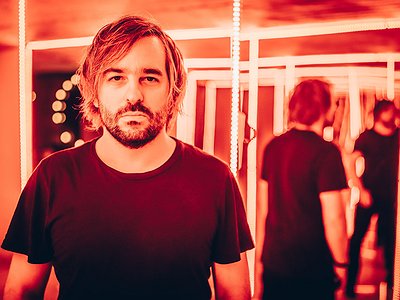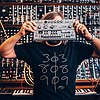Part 3
How do you see the relationship between the 'sound' aspects of music and the 'composition' aspects? How do you work with sound and timbre to meet certain production ideas and in which way can certain sounds already take on compositional qualities?
In a way I would say that I am a fairly conventional producer in that I have instruments, I play them, find something good, record it, and try to preserve it in the post production process as good as I can. My instruments are synths, but it’s not too different from working with acoustic, traditional instruments. I love to record “finished” sounds with reverbs, delays, distortion, whatever it takes. So what I hear when I’m jamming at the studio is pretty much what you get when the tracks are finished.
Other producers don’t value the initial recording so much. They take whatever source, go on a fishing mission, apply whatever processing they want and ultimately come up with something they like. It’s a great way of working, and I’m not saying one is better than the other, but this doesn’t seem to be my path. I’m getting bored, I’m getting confused after a while, and I see no point in being careful during the recording process when what you intended to be a bassline might end up as some tiny, sparkling crackle on the left channel. Like I said, this is cool for many people, but I don’t like it so much for my own work.
That said, I started to experiment with effects pedals very soon after starting to play electric guitar. To me what I played was always only one side of the coin, how it sounded was just as important. Adrian Utley, the Portishead producer and guitarist, has been a huge inspiration here! He is playing all these simple, repetitive things, but they always have tone, heart and character in spades! Sometimes the sound design becomes part of the composition. The reverb was what inspired me for the main melody of ‘Stars’. Without the reverb it sounds boring and stupid, but with the reverb it just starts to bloom. In the end my tracks are fairly “composed” as a result. It is less of a sonic collage, and more of a composed piece of music. But this should not sound like I don’t care about sound or sonic details! I have chosen all my instruments and sound processors because they give me a certain something.
Our sense of hearing shares intriguing connections to other senses. From your experience, what are some of the most inspiring overlaps between different senses - and what do they tell us about the way our senses work? What happens to sound at its outermost borders?
You may have gotten this idea already, I am a very visual person also, and I almost started a career as a painter and sculptor when I was in my early 20’s, so I like all these visual metaphors, and I am using them all the time. I like to think of sound as three-dimensional sonic sculpture unfolding in real-time, and basically just in our minds: “the greatest art form that doesn’t exist”.
Of course, when making electronic dance music, there is a very physical, visceral component, too. The feeling of the bass in the body is priceless, and in that sense club music cannot just be heard, it can also be felt. What I love about sound is that our auditory senses are basically hard wired to our motherboard; it’s a very ancient thing.
In evolutionary terms our sense of hearing has been a very important tool for us to survive. We humans tend to orientate a lot with our eyes, but we don’t have 360° degree vision, and this is where the ears come into play. The way that our audio perception works it has been designed to warn us from dangers we can’t see, to give us a sense about the direction where something is going on, and it does so with extremely fine resolution. Our eyes can only detect 12 frames per minute as discrete steps, that is a frequency of 12 Hz! After that it becomes a continuous motion to us. A seemingly fluid movie frame rate is double this amount, 24 Hz, and that is just barely above the perception threshold of our ears, which go all the way up to 20,000 Hz. That’s a remarkable resolution, extremely precise on the time scale! Extremely short run-time differences, phase shifts, ultimately give us directional hearing. These things are so fascinating to me.
Art can be a purpose in its own right, but it can also directly feed back into everyday life, take on a social and political role and lead to more engagement. Can you describe your approach to art and being an artist?
First and foremost, I am a human with thoughts and feelings and art is what I chose to do. I can’t separate these things from each other. That said, historically the arts have not only been self-centred, “l’art pour l’art”, they have also been a field for experimentation in terms of society, politics, new ideas, and often artists have been trailblazers in that sense.
I think we have a duty to position ourselves and speak up if and when the times are requiring it. But we not only have this duty as artists, but also as citizens or even, plainly, humans. I don’t want to artificially inflate what I and we are doing, but at least in theory, Techno is a certain statement in itself – everybody from all walks of life coming together under the same beat.
The real world can’t always live up to this idea, but personally I don’t see skin colours or the likes, I see fellow humans. And in that sense we musicians are ambassadors of this idea, of helping to advance the inclusive nature of Techno. No matter where you are in this world, there is a common language to be found in the music, and it’s such a beautiful thing to actually find it.
Of course, there is the other side too: escapism, hedonism, consumption, this all has its place as well. But ultimately music is bringing people together in such a beautiful thing. I try to let the music speak for itself as much as I can, but I’d like to think, I’m a very political person, and I can be very opinionated too. I don’t communicate this on every corner, but I will make my voice heard when I deem it necessary.
I’ve been an avid newspaper reader since I was a kid, I like to know what’s going on in the world – I read a lot, across the whole political spectrum and also international publications! Today, especially with the Corona situation, I’m shocked to see how easily people seem to fall for all sorts of conspiracy theories. Reading, thinking and discussing things as much as I do, makes you practically immune against that sort of thing.
It is remarkable, in a way, that we have arrived in the 21st century with the basic concept of music still intact. Do you have a vision of music, an idea of what music could be beyond its current form?
Pop music in a more general sense, and especially electronic music has been very technology driven from the early days, and this mostly was a great thing. The way that the Beatles and others discovered the studio as an instrument already in the 60’s, and everything else that came afterwards. Often, new technologies emerged and suddenly made new ways of thinking, of musical expression possible.
Somehow, we seem to live in a post-postmodern world where everybody can have a whole studio with the accumulated technology of more than half a century of pop music inside a portable device. When has the last new form of synthesis emerged, the last groundbreaking new tool for electronic music? Either way it has been ages ago, and anything is possible these days, wherever you are. In a way this is great, because everyone can start to make music in almost an instant, without a prior six-figure investment.
We have seen so many things come and go – quadrophonic sound, surround, now people are experimenting with AR and VR. But in the end we still have two ears and a very ancient way how they are wired into our perception apparatus. I’m getting a bit bored with this endless cycle of actual or apparent technical updates, developments, etc. Give me a left speaker and a right speaker and I give you stereophonic sound and try and tell a story for you. Or just give me an acoustic guitar or a piano, which don’t need any electricity at all, but which can radiate the most beautiful sound waves.
What I find boring, is music that exploits the latest technical gimmick for novelty. Often times this is more show than substance, and while it may seem flashy for a while it fades out of fashion quickly, and will sound very dated after a while. In the founding days, Techno was very much about finding new sounds and ways of expression, but now everything is much more saturated, and the ground-breaking technological paradigm shifts are far and few in between. I’d rather focus on the music instead of running after elusive “new sounds”.
In the end art is about capturing the essence of a moment and transforming it into something of universal relevance. And this can be felt regardless of the sound system, provided the artist succeeded with what they wanted to do. A great song is a great song, no matter whether it’s played on a simple guitar or by a symphony orchestra or by a bleepy modular system. For me, it’s all about the feeling, the emotions, the goosebumps. When I get them it’s all good and it doesn’t matter at all what kind of technology is involved!







